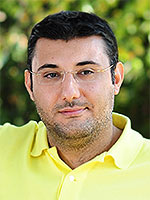Turkish Student Studies Armenian Genocide in the United States
 Umit Kurt was born in the city of Gaziantep in the southeastern part of Turkey to a Kurdish mother and “half-Arab and half-Turcoman” father. Before becoming a doctoral student of history and Holocaust and Genocide Studies (currently in his third year of study) at Clark University, he studied political science as an undergraduate at Middle East Technical University in Ankara and received a master’s degree at Sabancı University in Istanbul from its Arts and Social Sciences Department.
Umit Kurt was born in the city of Gaziantep in the southeastern part of Turkey to a Kurdish mother and “half-Arab and half-Turcoman” father. Before becoming a doctoral student of history and Holocaust and Genocide Studies (currently in his third year of study) at Clark University, he studied political science as an undergraduate at Middle East Technical University in Ankara and received a master’s degree at Sabancı University in Istanbul from its Arts and Social Sciences Department.
Umit became interested in studying genocide after he “came across mass atrocities and forced deportations of the Ottoman politicians carried out against non-Muslim groups within the Empire, Armenian first and foremost” in the late nineteenth and early twentieth century.
“Violence and annihilated policies against Armenians executed by the leaders of Union and Progress Party that was the governing party back then led my focus of attention toward genocide,” he says. “The most destructive policies were carried out against Armenians so as to obliterate them as a nation, religion, race, and a group of people.”
Umit decided to come to the United States to pursue his doctorate because he could not find a scholar in Turkey with whom he could study the Armenian Genocide. “As a matter of fact, scholars are not that bold to study on such an allegedly ‘thorny’ subject matter,” he says.
Umit chose to attend Clark to study with Taner Akçam, a renowned scholar of the Armenian Genocide.
While studying the history of the Armenian Genocide, Umit says that he has come to believe “that the formation of the Turkish national identity has a problematic and destructive potential and constitutes the source of many current-day problems…the national identity that forms the nation state often situates its own identity on the destruction of those that do not belong to that identity.”
And he says that “facing the ‘Armenian question’ is a critical factor to start such a discussion and Turkey’s—and perhaps my own—coming to terms with the past.”
After finishing his dissertation, The Emergence of New Wealthy Social Strata between 1915-1922: The Local Elites’ Seizure of Armenian Property in Aintab, and obtaining his PhD, Umit hopes to stay in academia and believes that his work “will contribute to the widespread recognition of Armenian Genocide all over the world, of course, particularly in Turkey,” he says. “What I aim to do with my own study is to shed light on an utter historical truth, the Armenian Genocide, to recognize it so that it would never happen again. If you want to prevent genocide, you should first recognize and make an official apology for that.”
Umit believes it is important for higher education institutions to provide an opportunity for students to study the history of genocide and genocide attempts because “students should be aware of past atrocities, mass killings, human right violations, colonial violence, and every kind of exterminatory policies of any nation against a race, religious groups, nation, or a group of people so that they will get” greater attention, he says. An awareness of these horrific events “will enable [students] to be judicious, responsible, and virtuous people who give huge importance to human life. In that way, they would also get involved…to prevent any genocidal policies no matter where they are being executed.”
This is an excerpt of “Intimate Proximity: The Human Face of Genocide,” which appeared in the January/February 2013 International Educator about colleges and universities helping to understand and prevent genocide.
Homepage image credit: Paul McKinnon / Shutterstock.com
